

On this page
Pc Mike Smith
Pc Goldsmith
Feuding in Rural England
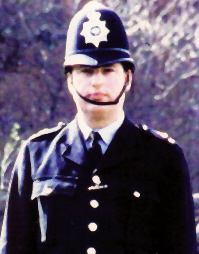
My name is Mike Smith; many years ago I was Buckinghamshire Police Constable 629, the last resident Bobby to serve at Lacey Green.
I moved into the village Police house on a cold November day in 1967, together with my two year old son, Neil, and wife Joan, who was just days away from giving birth to our second child. I had previously spent 4 years patrolling the High Wycombe area, working as part of a ten man section.
As a village Bobby I would now work on my own with supervision by Sergeant Bert Buggy at Princes Risborough. The Police house had a small office which contained a desk, filing cabinet, telephone, type writer, my own personal world war three early warning system and a large box containing an air raid siren. This was the cold war 1960's and our nearest neighbour was Strike Command HQ, the Soviet Union's number one nuclear target. I did a test run with the siren; it took 45 minutes to drag out into the front garden, read the instructions and assemble it. The estimated time of arrival of a nuclear missile strike was 4 minutes; this left me 41 minutes short of warning the good folk of Lacey Green of a very loud bang.
Other features of the Police House were a notice board outside the gate, a 'County Police' sign over the front door and a very loud bell above the bedroom door to indicate an incoming telephone call. The latter sounded at 2 am on our first night; I was still suffering from the shock when I answered the phone, the caller enquired if her lost cat had been found. On my way back to bed, I made a slight adjustment to the alarm bell and it never bothered us again. Joan still blames that alarm for the almost immediate arrival of our daughter Emma. We were, in every sense, living above the shop. The house itself was a bit basic by modem standards, having no electric points upstairs for example. It was built in the mid 1930's for £350.00 and was situated in Main Road, opposite Stocken Farm. The original Victorian Police cottage was just across the road and still occupied as a private residence.
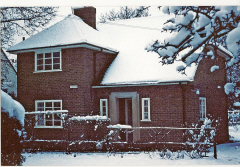
The village Bobby had been a common feature of rural life for many years, it required a Constable to live in the village and accept 24 hour responsibility for his beat, which in my case included Lacey Green, Speen, Loosley Row and Hampden. A married man was usually given this task, because his wife was expected to answer the phone and see to callers at the office when the Constable was out on patrol. Unfortunately, the public's expectation of my wife's legal knowledge was sometimes a little high, but taking in stray donkeys was all in a days work.

Prior to the 1960's, most Policing was carried out by a solitary patrolling Constable. Some personal radios were introduced in urban areas in the middle 1960's; unfortunately the range of this early equipment was too short for rural use. Traffic Division and Supervisory Officers had vehicles which were fitted with VHF radios, but mostly the Bobby's only means of communication was by telephone. This was achieved by a system of hourly fixed conference points, the Bobby would stand next to a prearranged public telephone box at a prearranged time, so that he could be contacted if required.
In High Wycombe we had the luxury of several Police telephone boxes, later to become more famous as Dr Who's Tardis. Without radios, Police response times to non urgent incidents could be a bit slow, but the public appeared to be aware of our limitations and reasonably tolerated the situation. A real bonus to my rural beat was the smart black 350cc Triumph motor cycle that went with the job, unfortunately, it was not equipped with a radio, but at least it beat cycling up those Chiltern hills.

Being on call at all hours took some getting used to, for example, I was just settling down to watch the Benny Hill show one evening when there was an urgent knocking on the door. A road accident had occurred on the bend near the school. When I arrived I saw the remains of a Delboy Trotter style three wheeled van, it had rolled over a couple of times and was now just a heap of plastic bits. Expecting the worse, I was surprised when four large blokes told me that they had been inside it at the time of the accident. Apart from a few bruises they appeared unscathed, a bit of a miracle when compared to the state of the van and there were no seat belts in those days. Sadly, traffic accidents were relatively common on the dark and twisting lanes of the Chiltern Hills. Patrolling those muddy lanes on two wheels could be quite challenging at times, especially after dark.
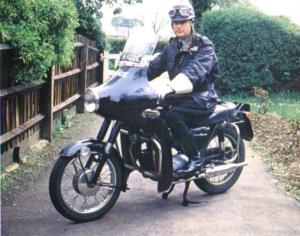
Much of the village Bobby's time was taken up with enquiries from other Police areas, or executing warrants, issuing summonses, taking witness statements, checking unoccupied property, issuing animal movement orders to Farmers during the foot and mouth outbreak, firearm and shotgun licensing enquiries, putting upside down sheep back on their feet, sometimes putting upside down drunks back on their feet, discouraging speeding motorists and joining my colleagues in Princes Risborough for the punch ups on disco night. There was always something to do, perhaps it would not be regarded as efficient Policing by today's hi-tech standards, but I do believe that it was quite affective, as proved by the low crime and disorder figures for the area. Importantly, there appeared to be a good measure of public support for this type of Policing in rural areas.
The essence of rural Policing was to get out and about as much as possible, and make contact with the local community. A normal daily routine was an 8 hour patrol, alternating between day and evening shifts, with occasional split shifts to confuse the villains. In those far off days, rural areas were relatively free from crime and disorder when compared with urban areas. During my time in the village I can only recall two crimes; one was a burglary at Lacey Green School for which I arrested three High Wycombe lads
The other was a theft from a motor vehicle, for which I arrested two Naphill lads. The second incident occurred at about one o'clock in the morning and highlighted the limitations of a motor cycle with no radio. I was riding past a parked car in Woodway and noticed two figures trying to hide inside the vehicle; there really is nowhere to hide inside a Mini. I arrested them for theft of the car radio and persuaded them to accompany me to the nearest phone box to call for transport to Aylesbury Police station.
On another occasion I came upon a suspiciously parked Jaguar car in Small Dean Lane, as this was the early hours of the morning I stopped to check the occupants. The occupants were four heavy looking Geezers with London accents, even in the dark I could see that the driver was wearing a bad wig. They looked like movie gangsters, or perhaps more accurately, movie gangsters looked like them. After they had reluctantly identified themselves, they departed. I checked their identities with Police records and was later surprised to get a call from the Flying Squad. They confirmed that the Geezers were members of a notorious South London criminal gang. There had been a gangland shooting in which a rival gang member received gun shot wounds, they believed that he was hiding somewhere in the area. One interesting aspect of being a Bobby is that you never know who you might bump into next, even in darkest Lacey Green.
I found that the good folk of my beat area did not require much close policing, they were largely law abiding, and my role had more to do with protecting life and property than law enforcement. Even the pubs were well behaved, but on one occasion I was informed that a rowdy group of yobs from High Wycombe were kicking up in the King William at Speen. When I arrived I was met by a bar full of grinning local lads. "They've gone." I was informed. "They won't be back." Self policing pubs, a Bobby's dream. Rumour has it that on occasion the odd pint or two of ale may have been supped after the end of normal licensing hours, but of course I never actually came across such a practice.
Perhaps something more typical of a rural Bobby's work occurred while patrolling through Hampden where I came upon an escaping flock of sheep. I followed them down to Hampden Common where I rounded them up and headed them back down the lane. By the time I arrived at their field, the Farmer was waiting to shepherd them back home. Rounding up a couple of dozen sheep is one thing, rounding up a stray horse is quite another, especially for a town person like me. I was not keen on horses, my view being that anything that big, that travels that fast without brakes is not natural. I looked this particular beast in the eye, he snorted threateningly and shook his head; it was a classic stand off. Then a little girl appeared from nowhere, took hold of the monster and quietly walked it into a nearby field. Of course, I was just about to do that very thing myself.
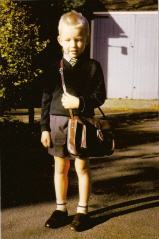
When off duty I would like to join some of my colleagues from Risborough for a pint or two in the Pink and Lily, served up by the lovely Sis and Ken. We would regularly be thrashed at crib or dominoes by some of the local characters, I have fond memories of those evenings spent in front of that roaring log fire. I am pleased to see that the little bar is still exactly as I remember it. The old mill was in a sorry state in the 1960's, happily it is now restored to its former glory. I was also happy to see my son, Neil, start his education at the little village school, he was very proud of his smart green uniform.
Other memories of the village are, Hickman's well stocked store, the Palmer and Harvey warehouse in Church lane, it backed on to the Police house and had a very loud burglar alarm facing my bedroom window, the beer license only pub in Church lane, now sadly gone, the forge in Loosley Row, the old Post Offices in Loosley Row and Speen, and of course, the little Lady who walked miles each day to deliver the mail. Many of the local residents were from families who had been established in the area for generations, especially the many small farms. Lovely people as I remember, but the local Chiltern dialect did take some getting used to.
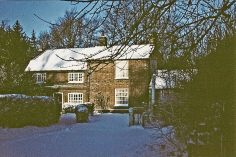
On the first of April 1968, Buckinghamshire Constabulary amalgamated with the Police Forces of Oxford County, Oxford City, Berkshire County and Reading Borough, to become The Thames Valley Police. At the time, many of us felt that we had lost our small county Constabulary identity, but the times they were a changing and we had to change with them. The amalgamation increased our establishment from just over 600 Officers to about 2500; Constabulary duties would never be quite the same again. In 1969, it was decided that having a Constable dedicated to a few small villages with very little crime or disorder, was not an efficient use of manpower. It was the beginning of the end for the traditional village Bobby. I was posted to Princes Risborough where I took on mobile patrol duties over a much larger area. I continued to live at the Police house until 1971 when I moved to Aylesbury. Now retired these many years, I remember those days at Lacey Green with some affection and feel privileged to have been part of the village Bobby tradition.
l think l must have been away doing my National Service in the RAF, PC Frank Goldsmith's children were at Lacey Green School the same time as me - their dad was a good man!
l recall at the end of WW2 all arms and ammunition were to be 'given in.' My Dad had a revolver which he bought in France during the 1st war to shoot rats and while away the time awaiting repatriation. Dad gave me the revolver, which l put in my pocket, and said, "Take it to PC Goldsmith." l did as was told and did l get a rollicking from PC Goldsmith!!
After retirement he lived in Eastfield Road, his wife sadly died early on in life.
He often sat on the door for the Risborough YFC Dances. We kept him well supplied with beer!!
My mother in law, who lived at Woolerton Court, told me one day she was worried about a man coming to live in the flat next door. It turned out to be a Mr Goldsmith - ex PC. l told her she was a lucky old thing!!
He later became very ill and Mother-in-law took great care of him with hot meals and cups of tea. I often sat with him and he told me many stories of his past years. This is when he went into great details of the time Air Vice Marshall 'Bomber' Harris's young officers bet him, whilst in the officer's mess, that he couldn't land on the New Road at Lacey Green and take off again - he won the bet!!
Not just rural England but actually in Lacey Green in the early 1900's - Tilbury v Callander -
From an article dated 18th September 1914 found in the Bucks Free Press by Rita Probert but currently provided, perhaps not surprisingly, by Doug Tilbury.
At Aylesbury Petty Sessions on Saturday, before the bench of Mr R W. Locke (chairman), Dr West and Mr T Thorne.
Alec Callander, farmer of Lily Bottom Farm, was summoned for assaulting and beating Archibald George Tilbury and Alfred Tilbury on 7th September.
There was a cross summons by Alec Callander, charging Alfred Tilbury with threatening to shoot him who, in consequence, was afraid that Alfred Tilbury would do him bodily injury. Both parties pleaded not guilty.
Solicitors - Mr Stanley E Wilkins, Aylesbury, appeared for the Tilbury's and Mr R S Wood, High Wycombe, represented Callander.
Archibald George Tilbury, 11, son of Alfred Tilbury, said, he left home at 8.15am to go to school. When he got to defendants premises Alec Callander stopped him and said he had let his cows out. The boy denied it and Callander then hit him on the ear four times. The boy went home crying and returned with his father and mother to Callander's. The father asked to see 'Alec' and Charles Callander said, 'If you want him you must find him'. Alec then appeared and the father said, 'What did you hit my boy for?' He replied that the boy had let his cows out and the father asked if he could prove it. Alec Callander then struck the father on the ear with his fist, grabbed hold of him and they both fell to the ground. At no time did his father threaten the accused or mention anything about shooting.
Cross-examined by Mr Wood: It was true that the Callander's had complained of the gate being opened and the cattle getting out, but he had not opened it. Witness was not cheeky on one occasion. It was untrue to say that boy had been driving the cattle that day.
Alfred Tilbury, farmer and father of the last witness, said he was working in the Meadow at Lily Bank Farm with his coat off when his boy returned and told him what happened. He, his wife and the boy went to Callander's farm where he asked to see Alec Callander. Alec came down the yard and was asked why he had hit the boy. Alec Callander replied, 'Because he has been letting the cows out.' When asked if he could prove it Callander said, 'Yes I can' and struck the witness on the ear and caught hold of him. They closed and fell to the ground. At no time did witness threaten to shoot Callander, nor did he use the expression that he would shoot them all. He did not strike Callander nor threaten to.
Cross-examined by Mr Wood: He did not go to the farm to give Callander a 'hiding'. It was true he undid his shirt when Callander came towards him but that was for fear Callander should gasp his neck.
Minnie Tilbury, wife of the last witness, gave corroborative evidence and added that there was a gap in Callander's hedge.
Mrs Beatrice May Rixon of Lily Bottom spoke to having seen Alec Callander go up to Alfred Tilbury in a fighting attitude and strike him on the ear.
Constable Cox said Archibald Tilbury made a complaint to him and he saw the boy's ear was swollen and red. The Constable added that there was a gap in Callander's hedge which was subsequently repaired by Charles and Alec Callander.
Alexander Callander of Lily Bottom Farm said that on the morning in question he saw Archibald Tilbury open the gate in the field. The cattle were standing near there and two ran out. The boy shut the gate and Callander went across to him in the road. He said to the boy, 'Hallo, what are you up to?' and told Tilbury that he has seen him open the gate. The boy got underneath a rail and ran home crying. He'd never touched the boy.
Later he saw Alfred Tilbury in the farmyard. The Latter said he would shoot them all and
threatened to fight him. Then they met and Alec Callander received a blow to the chest. Alfred Tilbury was very excited. Callander had been threatened previously - there was friction between the families.
Cross-examined by Mr Wilkins: He could not say where the boy was driving the cattle after they had got out of the meadow. He suggested that the boy had come there to tell an untruth. He had not got within five yards of the boy. He could not account for the boy going home with a red and swollen ear, except that he might have caught his ear on the rail.
Charles Callander, brother of the last witness, said his brother threatened the boy but did not hit him. The boy then ran away crying. Later Alfred Tilbury came to their house and his brother came to see what he wanted. When he got within a few yards of Albert Tilbury the latter said, 'I'll shoot you all' and struck his brother a blow. A tussle ensued. He was certain Tilbury struck the first blow.
Mrs Callander, mother of the accused, stated that Alfred Tilbury came to her yard in a hot, excited state and asked for Alec. Tilbury declared he would shoot them and when Alec appeared Tilbury struck him, both falling in the roadway.
The Bench found Alec Callander guilty of an assault upon both Archibald and Alfred Tilbury fining him 10 shillings with 9 shillings and 6 pence costs and £1 with 8 shillings and 6 pence costs respectively with a month in prison on default.
The justices were not satisfied that Tilbury had made any threats to do bodily harm and that case was dismissed.
It didn't end there. What couldn't be stated during this trial was that a further assault had taken place requiring committal proceedings?
Charles Callander - Committed for Trial
Charles Callander was charged that on 7th September he inflicted grievous bodily harm to Alfred Tilbury. Mr Wilkins appeared for the prosecution and Mr Wood the defence.
Alfred Tilbury detailed the occurrence at Callander's yard as related in the previous trial and added that whilst he and Alec Callander were on the ground he received a 'hardish knock on his head. He looked up and saw Charles Callander just in front of him with a huge stick in his hand. Tilbury got up and went across the road to his own field. His head was bleeding. The accused followed him into the field and struck him with the same stick on the hip. Mrs Tilbury intervened and they went to Mrs Rixon's. Accused and his brother then went back whilst witness was driven to Risborough to see Dr Watson. Mr Tilbury was still feeling the result of the injury to his head and his back was causing him great pain as well as the blow to his hip.
Cross-examined by Mr Wood: He did not strike Alec Callander at all while they were on the ground. Witness did not hear Alec call to his brother for help. Mr Tilbury saw the stick produced in accused's hand after the blow had been struck. Witness got up unassisted and crossed the road.
Archibald George Tilbury, 11, son of Alfred Tilbury said that while Alec Callander and his father were on the ground he saw Charles Callander hit his father across the back with a thick stick. Accused then struck his father across the head with the stick, which he held in both hands. The stick was like a little stake.
Mrs Tilbury corroborated the evidence previously given and said she thought her husband was going to die, he looked frightened to death. When her husband went into the meadow he was struck on the left hip by Charles Callander. She saw blood flowing from her husband's head and ear, so she rushed between them and put her hand on her husband's head. As she returned home she saw Charles Callander in his yard. He said, 'That's what he wanted and I'll let him have it again. I'm not afraid'.
Mrs Rixon stated that she saw Charles Callander hit Alfred Tilbury on the back with a piece of wood. His head bled very much and his ear was cut.
Dr F S Watson from Princes Risborough stated that at 9am on September 7th Alfred Tilbury was brought to his surgery suffering from a contused wound at the top of his head, two inches in length almost in the centre of the head. The wound was a jagged one and the surrounding tissues were very contused. The injury could have been caused by a stick similar to the one produced and was the result of a heavy blow. The lobe of the left ear was torn away from the cheek and the cartilage was split down. There had been a great deal of hemorrhage from both wounds. He could not say how the wound to his ear had been caused. Mr Tilbury also complained of his back but the Dr was unable to find any visible evidence of injury to his back or hip. Mr Tilbury was still under the Dr's care and he had found bruising on the hip. It was a severe wound to the head the bone being exposed in the front.
Cross-examined by Mr Wood: The injury indicated a very severe blow. The injury to his the ear might have been caused by a nail in the fence.
Sergeant Timber of Princes Risborough arrested the accused, whom at Aylesbury police station said, 'He got what he deserved.'
The Sergeant searched the farm and found the stick produced lying about 15 yards inside the gateway of the farm.
Cross-examined by Mr Wood: There were other sticks in the yard.
PC Cox of Lacey Green stated he saw Sergeant Timber pick up the stick in the yard. While the latter was taking the stick away Mrs Callander said to Charles Callander, 'Can't you find a thinner stick than that and say it's the one. '
Mrs Callander, who was in the back of the Court was heard to say, 'Oh no'.
Alec Callander said, 'It is immaterial, let him take it' and his brother said the same.
Defendant was then charged by the court and entered a plea of Not Guilty. He reserved his defence and stated he would call his witnesses at the trial.
The Court committed the defendant to stand his trial at the Quarter Sessions. Bail was allowed in sum of £25 and his mother in a like sum as surety.